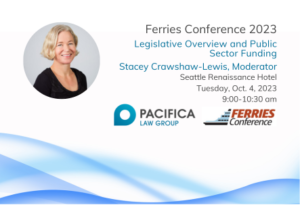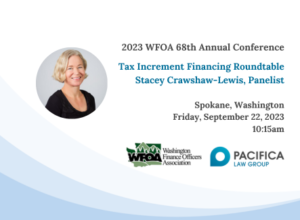
July 6, 2023
IRS Proposes Inflation Reduction Act Rules for Clean Energy Infrastructure Project Incentives
On June 14, 2023, the IRS proposed rules for a key provision of the Inflation Reduction Act of 2022 (Pub. L. 117-169) (the “IRA”) that incentivizes clean energy infrastructure projects: direct elective payments in lieu of tax credits. Prior to the IRA, state and local governments did not have access to various federal tax credits available for clean energy projects, as these tax credits could only be utilized by entities that pay federal income taxes. States, municipalities and other “applicable entities” are now eligible for these payments. The proposed rules also offer examples of how state and local governments might leverage the payments to fund projects.
Below we discuss the proposed rules, and highlight additional helpful resources and next steps.
Definition of Applicable Entity
The IRA authorizes direct elective payments to “applicable entities” in lieu of tax credits to incentivize a range of clean energy investments, including solar and other renewable energy projects and vehicle fleet electrification. The proposed rules define “applicable entity” broadly to include, among other state and local government entities, any agency or instrumentality of any state or political subdivision. The IRS explains: “States, political subdivisions and their agencies and instrumentalities are all eligible for elective pay. This includes the District of Columbia. It also includes cities, counties and other political subdivisions. Water districts, school districts, economic development agencies, public universities and hospitals that are agencies and instrumentalities of states or political subdivisions are also included.” The proposed rules’ inclusion of agencies and instrumentalities would make state agencies, public development authorities, and other instrumentalities eligible to receive direct elective payments for qualifying projects.
Other Clarifications
The proposed rules also clarify that the applicable entity generally must own the property that gives rise the eligible credit (or undertake the activities giving rise to the credit) through direct ownership, through ownership by a disregarded entity, through ownership of an undivided interest in a tenancy-in-common, or pursuant to certain joint operating arrangements (but not through a partnership). In addition, the proposed rules provide several examples of how state and local governments may combine sources of funding for the project, including grant funding and bridge financing, with elective payments.
Elective Payment Guidance
- The IRS published this helpful chart summarizing the tax credits that are eligible to be distributed as elective payments. The chart also lists the bonuses that increase payment amounts, including bonuses for meeting prevailing wage, qualified apprenticeship and domestic content standards.
- The IRS published this fact sheet for state and local governments that explains the process for claiming an elective payment.
- The IRS also published FAQs describing the elective payments.
The White House previously released an updated guide to the elective payments as well as the IRA’s grant and loan programs. States and municipalities are eligible recipients for a number of these grant and loan programs, including for clean heavy-duty vehicles, qualifying port equipment and technology, neighborhood access and equity, adoption of updated building energy codes, climate pollution reduction strategies, and a number of other clean energy and climate initiatives.
Next Steps
Comments on the IRS proposed rules are due on August 14, 2023. If you have questions regarding these incentives, please contact any of our public finance attorneys.
| Alison Benge | Alison.Benge@pacificalawgroup.com | 206.602.1210 |
| Deanna Gregory | Deanna.Gregory@pacificalawgroup.com | 206.245.1716 |
| Faith Li Pettis | Faith.Pettis@pacificalawgroup.com | 206.245.1700 |
| Jon Jurich | Jon.Jurich@pacificalawgroup.com | 206.245.1717 |
| Stacey Lewis | Stacey.Lewis@pacificalawgroup.com | 206.245.1714 |
| Toby Tobler | Tobias.Tobler@pacificalawgroup.com | 206.602.1215 |
| Katherine Van Gunst | Katherine.VanGunst@pacificalawgroup.com | 206.602.1213 |
A Note: This publication is for informational purposes and does not provide legal advice. It is not intended to be used or relied upon as legal advice in connection with any particular situation or facts.


